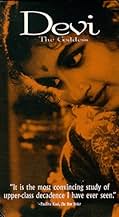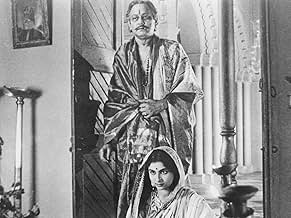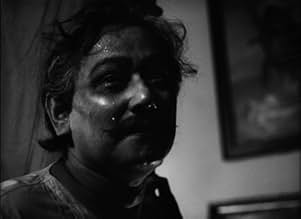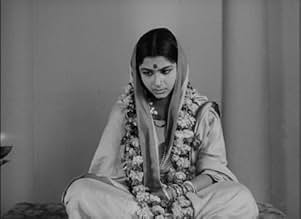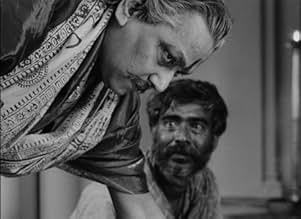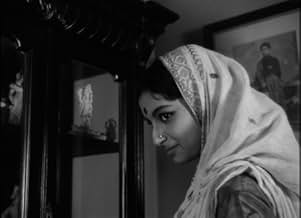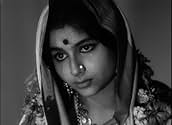IMDb-BEWERTUNG
7,7/10
3099
IHRE BEWERTUNG
Füge eine Handlung in deiner Sprache hinzuA young woman is deemed a goddess when her father-in-law, a rich feudal land-lord, has a dream envisioning her as an avatar of Kali.A young woman is deemed a goddess when her father-in-law, a rich feudal land-lord, has a dream envisioning her as an avatar of Kali.A young woman is deemed a goddess when her father-in-law, a rich feudal land-lord, has a dream envisioning her as an avatar of Kali.
- Regie
- Drehbuch
- Hauptbesetzung
- Auszeichnungen
- 1 Gewinn & 1 Nominierung insgesamt
Soumitra Chatterjee
- Umaprasad
- (as Soumitra Chattopadhyay)
Karuna Bannerjee
- Harasundari
- (as Karuna Bandyopadhyay)
Purnendu Mukherjee
- Taraprasad
- (as Purnendu Mukhopadhyay)
Arpan Chowdhury
- Khoka - Child
- (as Shriman Arpan Chowdhury)
Anil Chatterjee
- Bhudeb
- (as Anil Chattopadhyay)
Empfohlene Bewertungen
This film was made in 1960. This is interesting because it is highly doubtful that the same film could be made in India today, in spite of India's massive film industry. The film does a great depiction of the crisis faced by people struggling to be modern yet encumbered with the traditional systems and the specter of having been colonized.
The younger son is ready to walk away from the bondage of traditional and as he sees, the superstition of the traditional life. Of course, he is reaping the benefit of life as a high caste. His young wife becomes the Devi - the embodiment of the goddess. This film also works well for its psychological content for the way we see the father project his desires onto those around him, and the choices faced by each character. In light of the fundamentalism worldwide - Christian, Muslim & Hindu - it is hard to image that this film could be made today in India since it leans to a skeptical view of Darsan and the goddess.
The younger son is ready to walk away from the bondage of traditional and as he sees, the superstition of the traditional life. Of course, he is reaping the benefit of life as a high caste. His young wife becomes the Devi - the embodiment of the goddess. This film also works well for its psychological content for the way we see the father project his desires onto those around him, and the choices faced by each character. In light of the fundamentalism worldwide - Christian, Muslim & Hindu - it is hard to image that this film could be made today in India since it leans to a skeptical view of Darsan and the goddess.
Being a Bengali, I had the privilege to read the original story by Prabhat Kumar from which the screenplay was adapted, and the story had a concrete conclusion with a deep impact where Ray finished it with surrealism and abstraction. Mostly he avoided the actual ending to bypass the social stigma which prevailed at that time. Also the story provides a very intimate adoration between the lead couple which was also avoided for probably the same reason.
Apart from that it possesses all the characteristics of Ray's direction with thrilling music, cinematography and screenplay. Definitely a must watch.
Apart from that it possesses all the characteristics of Ray's direction with thrilling music, cinematography and screenplay. Definitely a must watch.
After watching Satyajit Ray's The Apu Trilogy (1955-1959), which are now my favourite films of all time, I was looking forward to watching Devi, the next film Ray directed after The Apu Trilogy. Although I couldn't feel the same kind of emotional connection with the characters in Devi that I felt in The Apu Trilogy, this film was thought-provoking and very intriguing to watch.
Devi dealt with a serious issue in Bengali society at the time in a mature manner and Ray's direction and cinematography for this film was just as superb as The Apu Trilogy. It starred Soumitra Chatterjee and Sharmila Tagore once again as a married couple, like in Apur Sansar (the final part of The Apu Trilogy). However, whereas it was Soumitra who played the lead role in Apur Sansar, this time it's Sharmila who plays the lead role in Devi. Her performance was very subtle for the first half but her delusional performance towards the end was very convincing. Overall, I'd highly recommend this movie to any Satyajit Ray fan.
8/10
Devi dealt with a serious issue in Bengali society at the time in a mature manner and Ray's direction and cinematography for this film was just as superb as The Apu Trilogy. It starred Soumitra Chatterjee and Sharmila Tagore once again as a married couple, like in Apur Sansar (the final part of The Apu Trilogy). However, whereas it was Soumitra who played the lead role in Apur Sansar, this time it's Sharmila who plays the lead role in Devi. Her performance was very subtle for the first half but her delusional performance towards the end was very convincing. Overall, I'd highly recommend this movie to any Satyajit Ray fan.
8/10
In the countryside of India, Umaprasad (Soumitra Chattopadhyay) has been happily married with his seventeen year-old wife Doyamoyee (Sharmila Tagore) for three years. They live in the house of Umaprasad´s father Kalikinkar Roy (Chhabi Biswas), who worships the goddess Kali, with Umaprasad´s elder brother Taraprasad (Purnendu Mukhopadhyay), his wife Harasundari (Karuna Bandyopadhyay) and their child Khoka. Umaprasad has a conversation with Doyamoyee and explains that he will move to the big city to study English and she questions why he needs to travel to go to school. Sometime later, Kalikinkar has a dream that Doyamoyee is the reincarnation of Kali and the locals come to Kalikinkar´s house to worship her. Doyamoyee asks Harasundari to write to Umaprasad and soon he returns home. But Doyamoyee has been brainwashed with the situation and begins to believe that she might be the reincarnation of Kali leading the family to a tragedy.
"Devi", a.k.a. "The Goddess", is a little gem with a story of family tradition (and respect), religion, superstition and ignorance in the Nineteenth Century in India. "Devi" is beautifully shot in black-and-white and has magnificent performances and a perfect open conclusion. My vote is eight.
Title (Brazil): "A Deusa" ("The Goddess")
"Devi", a.k.a. "The Goddess", is a little gem with a story of family tradition (and respect), religion, superstition and ignorance in the Nineteenth Century in India. "Devi" is beautifully shot in black-and-white and has magnificent performances and a perfect open conclusion. My vote is eight.
Title (Brazil): "A Deusa" ("The Goddess")
Satyajit Ray made "Devi" in 1960. It was only his sixth film after completeing his 'Apu Trilogy' and "The Music Room" but it's much less well-known and little seen today. It's also a masterpiece. The great Chhabi Biswas, (he of "The Music Room"), once again plays a rich, lonely old man who comes to believe his daughter-in-law is a reincarnation of the Goddess Kali. If the tale is a fanciful one it's grounded in the harsh realities of the India of the time, (it's set in the mid-nineteenth century), and its heart is a heart of darkness. Goddess or witch, the end result is the same; such superstition can only have a tragic outcome and this is one of Ray's finest tragedies. Working again with what was basically his stock company, Ray draws superb performances from his cast and like so much of his work, this is a great ensemble piece, superbly shot by Subrata Mitra and scored by Ali Akbar Khan. It's a film that cries out for restoration and rediscovery.
Wusstest du schon
- WissenswertesSharmila Tagore was just 15 when she filmed this role.
- Zitate
Kalikinkar Roy: [while Doyamoyee strokes his feet] Do you know who I'm worried about? I'm worried about your Christian husband. You never know the intention of boys today.
- VerbindungenFeatured in The Story of Film: An Odyssey: Sex & Melodrama (2011)
Top-Auswahl
Melde dich zum Bewerten an und greife auf die Watchlist für personalisierte Empfehlungen zu.
- How long is The Goddess?Powered by Alexa
Details
Box Office
- Bruttoertrag in den USA und Kanada
- 93.215 $
- Laufzeit1 Stunde 33 Minuten
- Farbe
- Sound-Mix
- Seitenverhältnis
- 1.37 : 1
Zu dieser Seite beitragen
Bearbeitung vorschlagen oder fehlenden Inhalt hinzufügen



